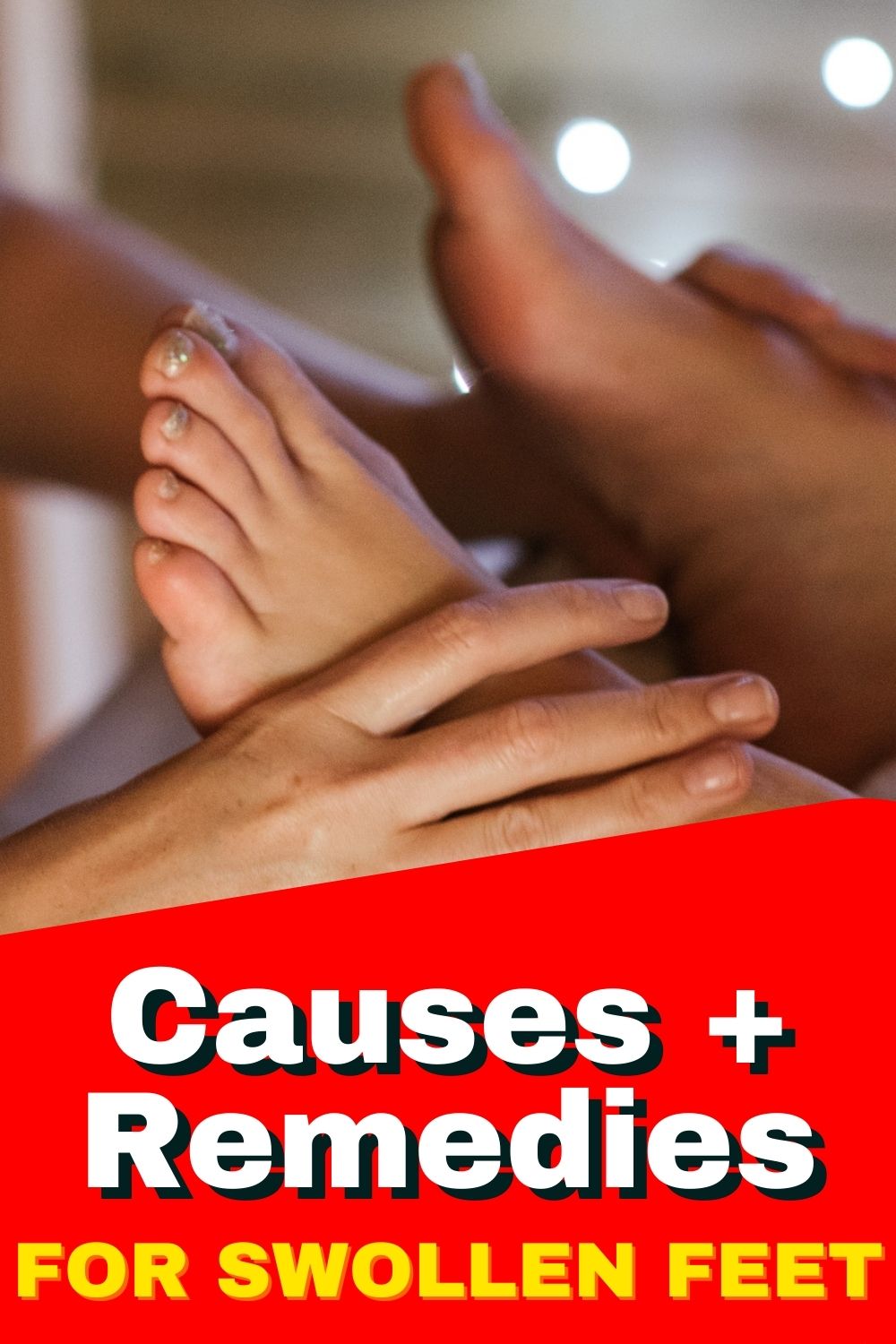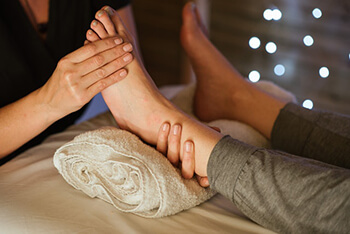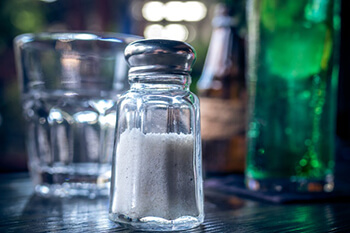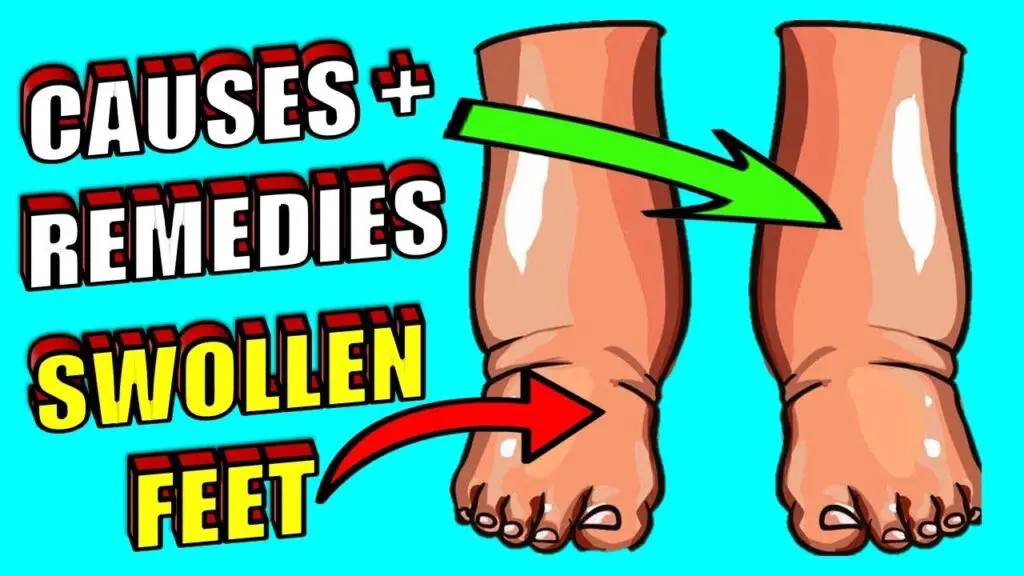Swollen feet are uncomfortable and can cause pain throughout the day. Swollen feet can be caused by many different factors, which will be discussed in this guide.
Before you book an appointment with your doctor, it's worth considering the natural ways to relieve swelling and pain. However, it's important that you learn the root cause of swelling, so that the best treatment can be found. In some cases, where the cause of the swelling is less obvious, you may need to visit a health professional.
Many of the home remedies below can be combined to help reduce swelling in the feet.
Causes of Swollen Feet
Edema
Most swelling in the foot and ankle is due to edema. Edema occurs when fluid gets trapped in the tissues of the body, causing uncomfortable swelling. This fluid retention can occur from many different health and lifestyle issues, including hot weather and more serious conditions, like cognitive heart failure.
Injury in the Feet or Ankles

Injuries or trauma can cause swelling, especially sprain or muscular injuries. Swelling from injury typically lasts between two to four days, but can last as long as a few months. The muscular injury can cause fluid retention, which presents as swelling in the feet and ankles.
Pregnancy

Pregnant women hold more water than usual. This can cause swelling in the feet and ankles. Typically, swelling occurs in the third trimester of pregnancy. The womb can cause pressure to build, restricting blood flow and causing fluid build-up in the ankles and feet. This tends to happen more if you have been standing a lot or it's a particularly hot day.
Preeclampsia
Preeclampsia is swelling during pregnancy that occurs suddenly and is severe. You may have preeclampsia if you have severe swelling, headaches, nausea, less frequent urination, higher blood pressure, vision changes, and vomiting.
If you think you may have preeclampsia, it's wise to talk to a medical professional and seek treatment as soon as possible, as this condition may develop into something more serious.
Lifestyle
Different lifestyle factors may account for swelling feet. People who are overweight, have a sedentary lifestyle, or wear ill-fitting shoes may be more at risk. Prolonged sitting and standing may also have an impact on how much, and how often, your feet swell.
Medication

Some medications may cause water retention and swelling of the feet. Hormones, steroids, blood pressure medications and anti-depressants can cause water retention. If you think that your medication is causing your feet, to swell speak to your doctor. They may be able to offer an alternative medication without these unpleasant side effects.
Heart Disease
Swelling of the feet can be a sign of heart disease. Heart failure can cause the body to retain salt and water, which causes the feet, legs, and ankles to swell. It's essential to contact a medical professional immediately if you believe you're experiencing symptoms of heart disease.
Liver Disease
Liver disease can cause blood to leak from the vessels, causing fluid to pool in the legs and feet. This happens because of a drop in albumin, which prevents blood from leaking from the vessels.
Kidney Disease
If you have kidney problems, you may be retaining more fluid than normal. Kidney disease affects the functioning of the kidneys, and they may not be capable of flushing out excess fluids, resulting in retention and swelling. Kidney disease typically doesn't present many symptoms until it's severe, or your kidneys begin to fail.
Symptoms to look out for are pain or pressure in the chest, less frequent urination, seizures, and shortness of breath.
Alcohol

Drinking excess alcohol can cause water retention. If your feet swell often, it may be a sign of kidney or liver disease, sometimes caused by excessive alcohol consumption. If you are struggling with excessive alcohol consumption, help is out there. Speak to a healthcare professional for advice and information.
Blood Clots
Finally, a blood clot in the leg can cause foot swelling. Blood clots prevent blood from moving towards the heart, causing feet and ankles to swell. If you have a blood clot, you will notice swelling in one leg and a change of color in the leg. Your symptoms may also be accompanied by low fever.
If you believe you have a blood clot, seek medical advice as soon as you can.

How to Treat Swollen Feet At Home
Increase Fluid Intake

An effective way to help with swelling of the feet is to simply increase the fluids you drink. Drinking more helps with retention as the body holds onto water when it is dehydrated. By maintaining good hydration levels, you can help reduce swelling.
Compression
Compression socks prevent swelling by squeezing certain areas to prevent the build-up of fluid in the muscles. This helps with muscle fatigue, and can reduce recovery times from exercise-induced strain.
Compression socks are a great way to help with painful swelling and reduce the amount of fluid build-up. They can be hidden within shoes for long journeys on planes, where swelling is more common due to long seated periods and pressure changes.
Elevating the Feet
By elevating your feet, you can increase circulation, which helps fluid to move within the body, ultimately helping to ease the swelling in the feet and ankles. To elevate your feet, simply prop them up above your heart using cushions, the arm of the couch, or a table. Make sure your feet are elevated for twenty to thirty minutes at a time.
Move Frequently
Standing or sitting for long periods of time can cause fluid to pool in the lower extremities. It's important to move frequently to prevent fluid retention within your feet. Take regular standing breaks from your desk, or, if you're standing in the same position, shift your weight every few minutes, and wear correct footwear to prevent swelling.
Massage Your Feet

Massaging swollen feet can help move excess fluid from the area and help reduce fluid retention. You can decrease swelling in the area by elevating the foot and using long strokes to massage it. Massaging the feet and ankles helps with poor lymph circulation and can reduce swelling in the foot.
Use Epsom Salt
Epsom salt contains magnesium, which has been found to help with muscle pain and reduce swelling. Using Epsom salt can help rid the body of the inflammation that causes swelling.
Fill a bucket or bath tub with water and add Epsom salt according to directions on the packet. Soak your feet for at least fifteen minutes to make sure you get the full effect - but don't leave them in for too long!
When using Epsom salt, it's important to make sure that you're not soaking in water that's too hot. Too much heat may cause swollen feet to get worse.
Lifestyle Changes
Diet

There are certain dietary measures that can be taken to help decrease swelling in the foot.
First, reducing salt can help with water retention. Too much sodium in the body can cause fluid retention and swelling in the lower extremities. Lower your salt intake and drink eight to ten glasses of water a day to combat this.
By increasing the amount of potassium and magnesium you consume, you can help balance water levels within your body and reduce swelling in your feet. Exercise is also a great way to help rid yourself of excess sodium and water.
Some of the healthiest foods containing potassium are bananas, salmon, oranges, cantaloupe, and pinto beans. Eating a balanced diet with the addition of these foods may help reduce swelling.
People who are overweight may have an increased likelihood of foot swelling due to poor blood circulation and a sedentary lifestyle. Talk to your doctor about ways you can implement healthier habits if you think you could benefit from losing weight.
Conclusion
There are many home remedies for swollen feet. By making small changes to your lifestyle, increasing the amount of healthy food and exercise, and using natural methods, swollen feet are easy to treat. By determining the cause of foot swelling, you can decide on the best way to treat it.
If you believe you have a kidney or heart condition, don't hesitate to talk to your doctor. However, if your fluid retention may be caused by muscle strain or an aspect of your current lifestyle, using compression socks, massaging your ankles and feet, or soaking your feet in Epsom salt may be the best combination of methods.


